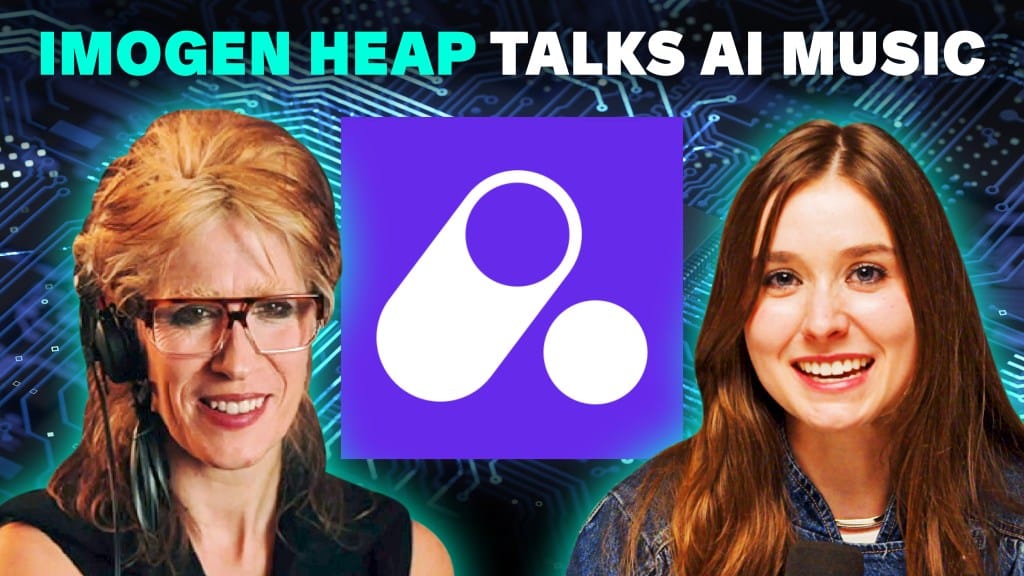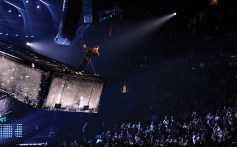Billboard On The Record

Trending on Billboard
Imogen Heap has always been known as an innovator in the music industry. The British singer, songwriter, producer and technologist has been experimenting with cutting edge tools to push her creativity forward since she first began releasing music over 25 years ago.
Now, as AI music continues to make headlines in the music industry and infiltrates the songwriting process, Heap is working on ethical ways to incorporate it into her own work. Recently, she released the song “I AM___,” a 13-minute epic that featured a collaboration between Heap and AI.Mogen, her self-trained AI voice model, and by collaborating with her digital self, Heap forces listeners to consider big questions, like the nature of art and self-identity.
Related
She’s also working on a company called Auracles, which recently announced a partnership with SoundCloud designed to create a verified digital ID for musicians that, in the age of AI, helps them track their music’s uses across the internet, grant permissions for approved uses of their work and create “the missing foundational data layer for music.”
To talk through how she’s using AI in a responsible and creative way as well as the 20th anniversary of her seminal album Speak For Yourself, Heap joined Billboard‘s new music industry podcast, On the Record w/ Kristin Robinson, this week.
Below is an excerpt of that conversation.
Watch or listen to the full episode of On the Record on YouTube, Spotify or Apple Podcasts here, or watch it below.
You’ve been watching this space for a long time, but when do you feel like you noticed a shift when everyone else started paying attention?
I feel like the silver lining, really, we definitely are at that place where it’s very confusing right now, and we do need some clarity, but we are, we can do it. There are tools, and everybody wants it. So I feel like the silver lining, really, of this dark cloud that’s on my seat as AI music taking over, is that we are going to get the data layer of works, we’re going to get this complete data layer of works because people will want to prove not only that they’re human, but they want to go there. They want to actually say, “No, I’m human and these are all my works that I actually contributed to.”
Hallwood Media is the first music company to be open about signing so-called AI artists like Xania Monet and imoliver. Do you think that major labels will start signing AI talent, or talent that uses AI very heavily, in the next few years?
I think a lot of things when you say that. I feel a lot of major labels are signing music that sounds AI generated to me anyway, it’s just like, ‘oh, that just sounds like that last thing and that last thing’ — nothing’s changed. So, it wouldn’t surprise me. I thought that that would happen, and wherever there’s money, obviously they’ll go if they think they can make money out of this artist.
Related
You recently released a 13-minute song called “I AM__” which featured you singing alongside AI.Mogen, which is essentially your own AI voice model. Why did you decide to collaborate with yourself, and what were you trying to say artistically?
It’s kind of a very long winded, kind of silly way to do things, but I did it as a statement. I did it to rile people up, I suppose, and just be able to have this conversation. Because the song, in the beginning, it takes you through this journey of what I’ve experienced over the last four years where I started to think about, ‘Who am I? What am I? And this ego, what is it?
And then I started to think about AI. Because what is AI? What can I feel that AI can’t feel? The noise section in that song is like the annihilation of my ego —I’m not saying I have no ego now — But then, after I needed a section for after care. I wanted to explore this idea that AI is our child. AI is something that we are raising together, as the as the mother and father. Right at the end, there’s the voice of AI.mogen. I wanted it to be an AI voice, even though I had to sing everything. The way I made this is I sang all the parts, and then I put it through my AI model so that the model of my voice is then singing the words. It’s like changing the sound on a on keyboard.
Yeah, so like a voice filter over your own performance, but this filter is also you in a way?
Yeah, and I wanted to trick people. After this quite traumatic noise section, they would feel something, and that voice would not be my voice would be the AI agent’s voice. I wanted to create a discussion. I wanted to, you know, show people that we already don’t know the difference between AI and human, but does it matter? I do say in the title, it’s AI.mogen, but it was all ethically sourced. It was all done in the best way possible. And it’s my own voice, and I didn’t use any, I didn’t generate any music.
Of course, some people already canceled me for, you know, even saying that AI is in my music. So many people have said: ‘You use AI to generate the song?’ I was like, ‘No, I did not. I wish I could, because it took me four years to do it with 100s of hours,’ but the point of this is everybody is fearful of it, but we can still feel. And what is art? Art something for someone, not to somebody else, but if a sense of it, it speaks to you and it makes you feel something does it matter if it makes you recognize something in yourself? I mean, essentially, or AI is generated from human.
Related
I love that you’ve been able to make this model that is totally within your control. I think the thing that gets scary is when anyone can create another person’s voice model online. I think such an important part of being an artist is having the taste and the curation to know what you want to say and don’t say. In an age of AI, it feels like you’re losing a lot of control over yourself. Do you have fears around that?
I mean, we already have lost control. People basically, you know, say that we’ve written something when we haven’t, and they don’t credit us when we have been a part of it. But that’s still very much less. I do think it’s gonna, really, it’s just gonna, it’s gonna force us into creating something that will make sense of what we have already and for the future, so that we can put a flag in the sand as humans and go, okay, up to this point, it was human generated. Again, I think it just comes down to this core missing piece that we don’t have which is an ID layer, like, identifying home for each individual.
AI almost completely lowers the barrier to entry for making music. As a trained musician, I’m wondering what your thoughts are on that?
Why not? Anyone who has spent 10,000 hours perfecting your craft will always have an edge. If you generate anything off these services right now, you’re just going to sound like 99.99% of other people who did that too, but if you have an edge, if you have a real something there that connects with people, you use these models differently. But, yeah, this helps everyone move forward. I don’t have problem with that at all.
Trending on Billboard AI is reshaping the music industry, and Grammy-winning singer, songwriter and producer Imogen Heap breaks down what this moment really means for creators. She joins host Kristin Robinson to unpack how she’s blended technology with artistry for two decades, the rise of generative AI and why it’s becoming harder to tell where […]
Trending on Billboard
The 2020s have been a turbulent time for agents and the musicians they represent. The decade started off with an unprecedented global pandemic that forced the shutdown of live shows indefinitely, and as lockdown orders lifted, early concerts often dealt with no-shows, rising costs and an over-supply of acts going back on the road at once.
Now, in 2025, the live music market is stabilizing, but it’s never looked quite like this. Artists are bringing more production value to shows than ever, festival ticket sales are softening and talents like Harry Styles and Beyoncé are offering fewer tour stops — but more nights in each location.
Related
Creative Artists Agency’s (CAA) top agents are in the midst of it all, often singlehandedly sparking trends with the decisions they make with their superstar clients when they are ready to hit the road. To talk through the evolution of live entertainment post-pandemic, CAA managing director Rob Light (Bruce Springsteen, Beyoncé, Ariana Grande, Fleetwood Mac) and co-head of global touring Rick Roskin (Slipknot, Eric Clapton, Santana, Kelly Clarkson) joined Billboard‘s new music industry podcast, On the Record w/ Kristin Robinson, this week.
Below is an excerpt of that conversation.
Watch or listen to the full episode of On the Record on YouTube, Spotify or Apple Podcasts here, or watch it below.
How did you make sure to help your artists’ tours stand out after pandemic lockdowns lifted and everyone rushed back onto the road?
Roskin: You have to make a statement because there’s a ton of volume. I mean, you can look at what plays in every city on a weekly basis, and there are a ton of shows. So somehow you have to figure out a way to cut through the clutter and break through and get noticed.
Light: A great example of that was three summers ago was with Harry Styles and his management team. Harry could have easily sold out two or three or four nights at MetLife Stadium. But everybody was playing Met Life Stadium. It wasn’t a big event, everybody was doing it. They came up with the idea of ‘let’s do 15 nights at Madison Square Garden.’ And he owned New York. Didn’t matter who was playing stadiums those nights. Everybody was talking about that move. It was a huge statement and intentional. I really do believe, you know, trying to find those moments are really part of our job. You can’t create them every day. You can’t create them on every tour, but any moves you’re making should hopefully lead to something.
Related
We’re also seeing artists like Beyoncé doing fewer cities, but more dates within those cities. I’m wondering why you think that’s occurring now?
Light: The cost of touring has gone up exponentially and the size of these productions becomes more and more intricate so that if you can sit in one place you can actually make them a little bigger and better — and the audience is willing to come to you. Beyoncé goes to New York for a week, for example, and Boston, Washington and Philly, they’re all gonna come to her if that’s the only place to see it. Also, if you have kids, sitting in one place actually makes touring more palatable.
I don’t think that the idea of day-to-day playing a city, getting on a bus and going to the next will ever go away, but if you have control of your career at that moment, it’s certainly easier to tour this way.
Roskin: To get a little technical, you know, a huge tour eight years ago or ten years ago, was about 13 semi-trucks [of production equipment]. I mean, that would be like, ‘Oh my God. That is a massive tour.’ You know, tours now are carrying 30, 40, 50 trucks of production. To move that is incredibly expensive. Everything has been amped up. In this boom post-Covid, artists are taking it to a level that no one’s ever seen before…Actually — The Weeknd’s stadium tour had about 60 trucks.
Let’s talk about Coachella 2026. Coachella decided to put its tickets for 2026 on sale very early this year. I have to say, I read that at the time as them maybe being nervous about not selling out. I know that that’s been an increasing issue for them over the last few years, but Coachella 2026 sold out pretty immediately. Why do you guys think it sold so quickly?
Light: Nothing replaces star power, and it’s a great lineup. Let’s be fair, but I think part of the reason they decided to go earlier is that they realize the public is getting more and more trained to buying earlier and so waiting till January feels late now… It was a great way for Coachella to make a statement about the festival season. They want to buy in advance, they want to make those plans, they want to be able to travel. I think was very smart on Paul [Tolette] and his team’s part to go earlier, and when you have that lineup — with Sabrina [Carpenter] and Justin [Bieber] — you’re going to do great. Why not go early?
Related
In general, it seems like festivals aren’t quite as hot as they used to. Ticket sales across the board are softening. Why do you think that is happening now?
Light: There’s a lot of factors. There’s no one answer that fills the floor. Part of it is, you’ve got so many shows and ticket prices have gone up. There’s decisions being made now, like ‘how much money do I have?’ I have to pick and choose where I am going to go. Part of it is who the headliners are, and then another part of it was just a proliferation of festivals. They were everywhere and you couldn’t go to every one. So when you feel softness at the edges, it’s really a function of ‘I can’t beat everyone. I have to pick and choose.’
Lately, festival attendees are arriving later to the festival, which means those baby artists who are at the bottom of the poster and the top of the day are going to have even less crowds than before. I’m wondering, do you still think that, for emerging artists at CAA, that being on those festival lineups is still as worthwhile as it once was?
Light: I’ve said this for years about those slots, and this is where agents really play a role in the artist development of a career. Part of getting on a festival is being on the poster. You want to be part of that and playing at 12 or one or two o’clock may not be great, but a great agent is going to stop and say, How do I get back to that market within four or five months of having done that gig? Because two or 3,000 kids who might have seen me and have told their friends now want to be able to see them on their own, and so to just show up anywhere and play one day at two o’clock and disappear for a year? Is bad management, bad agenting. If you’re going to get one of those slots, how am I going to take advantage of that moment and make other things happen off the back of it?
Related
Along with the cost of touring rising, we’re also seeing ticket prices rise as well. I remember that Bruce Springsteen tried dynamic ticketing a few years ago, and that led to some of the tickets ending up being thousands of dollars. I’m wondering now, a few years later, like we’re reflecting back on that, how you feel about dynamic ticketing as a model for big tours?
Light: Bruce got a really bad rap because at that same time that one guy bought a ticket at a high price, Elton John and the Rolling Stones were charging tickets for twice the price. But because he was a working man, somebody took a shot at him. There’s always going to be supply and demand. It just is. And what we try to create, and all the ticket companies try to create, is the closest way to be fair, where the money is going to the artist, right? If we’re going to do dynamic pricing, and you’re buying a ticket at a higher price, but the artist is getting paid. He or she deserves that. They built that career. What we hate is when you know, scalpers and bots and stub hubs and all these middle people now are making money with no skin in the game. They did nothing other than got a ticket, and now they’re reselling it. The artist doesn’t see any of that money…But I’m a fan of dynamic pricing, simply because it allows everybody to be equal in the process so if I can afford it, and it’s a show I want to see, I get to pay for it. I want to see the artist get paid. I don’t want to see some outlier get paid.
The federal government is attacking Ticketmaster on multiple fronts right now. This includes the FTC suing the company, and it has to deal with resale. Do you think that Ticketmaster should play a part in the resale of tickets, and if it does, does there need to be a cap on the secondary market?
Roskin: On platinum ticketing, most artists have a cap on what they allow the tickets to sell for, usually the cap ranges from two to three times value. So even if the secondary tipping market exceeds that, it doesn’t feel like it’s so harsh. But as far as the secondary ticketing market goes, it isn’t going anywhere.
This was one of Rob’s stories, but I’ll tell it. Years and years ago, AC/DC was doing a tour, and they go out on the road, and they’re like, ‘we’re gonna sell all tickets paperless. You’re gonna have to walk in with your credit card, scan your credit card at the door. They’re gonna see your name. You go into the venue,’ and through this they thought they were going beat scalpers, and they’re going to finally win. What ends up happening is that the scalpers sent gift cards to their own people who bought tickets, and they walk up with the gift cards, scan the tickets, and they beat AC/DC’s brilliant idea to get rid of scalpers. They are always gonna find a way to get ahead. Be it bots, be it AI, whatever — it is our responsibility as agents is to figure out ways that as much money stays with the artist.
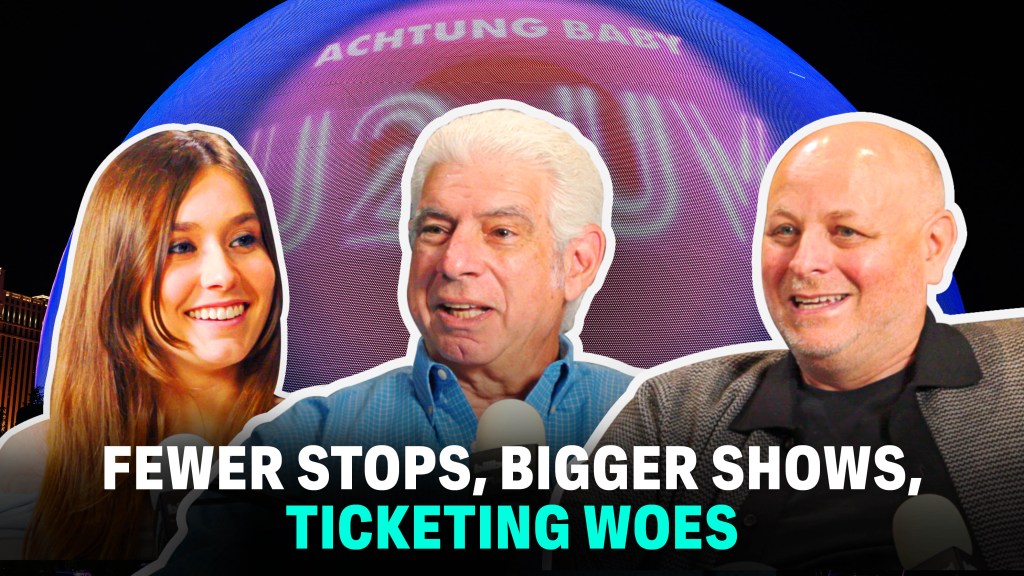
Trending on Billboard
Live music is booming, and CAA’s top touring execs explain exactly how today’s biggest shows come to life. Managing director Rob Light and co-head of global touring Rick Roskin join host Kristin Robinson to unpack the rise of live music’s modern era. They dive into the post-pandemic concert boom, how agents build tours from the ground up and what it takes for an artist to grow from a club act to a headliner. Light and Roskin discuss the balance between fair ticket pricing and fan demand and how agents fight to keep more money with the artists. They share how gut instinct still plays a role in spotting future stars, how massive shows like Harry Styles’ 15-night Madison Square Garden run come together and the evolving impact of festivals and social media on touring. Plus, they reveal the wildest artist requests, unforgettable live moments and their take on concert etiquette in the age of the live music boom.
Love what you hear? Follow Billboard On The Record on Instagram, Apple Podcasts, Spotify and Youtube @billboard so you never miss an episode.
Billboard On The Record is a podcast in partnership with SickBird Productions.
Kristin Robinson:
The business of live music has never looked quite like this. Stadium tours like Taylor Swift’s Eras tour are breaking records, ticket prices are breaking wallets, platforms like Ticketmaster are under greater scrutiny, and new venues like the Sphere are redefining what a concert can be. Artists are playing fewer cities, but staying longer. Fans are turning travel plans into world tours of their own. And behind it all — the economics, logistics, and expectations of touring are shifting in real time. So how did we get here, and what’s next for the live music business? Welcome back to On the Record, a music business podcast from Billboard and SickBird Productions. As always, I’m your host Kristin Robinson, and today we are joined by two of the most legendary agents in music, Rob Light and Rick Roskin of CAA. Rob Light is the partner and managing director of CAA, and he’s spent his career building up the touring businesses of some of the biggest artists in history of music. From Fleetwood Mac, Bruce Springsteen, Beyonce, AC/DC, One Direction, Katy Perry, Twenty One Pilots, Ariana Grande, and many more. He was also CAA’s longtime global head of touring, a role which has since been passed to our other guest this week, Rick Roskin. Rick now shares the global head of touring title with two others, Emma Banks and Darryl Eaton, and brings his own wealth of experience to the top job, working with a roster of clients like Eric Clapton, Santana, Kesha, Kelly Clarkson, Slipknot, The Black Keys, Fiona Apple, Iron Maiden and more.
Keep watching for more!

Trending on Billboard In this episode of Billboard On The Record, director Jon M. Chu and music editor Jack Dolman join host Kristin Robinson to talk about bringing the iconic musical ‘Wicked’ to the big screen. They dive into the process of adapting a beloved story, from working closely with Stephen Schwartz to deciding how […]
For over two decades, Keith Caulfield has been an integral part of the Billboard charts team, tabulating which singles and albums are the most popular in the United States. To be more specific, Caulfield — managing director of charts and data operations — looks after the Billboard 200, the standard bearer for an album’s performance […]
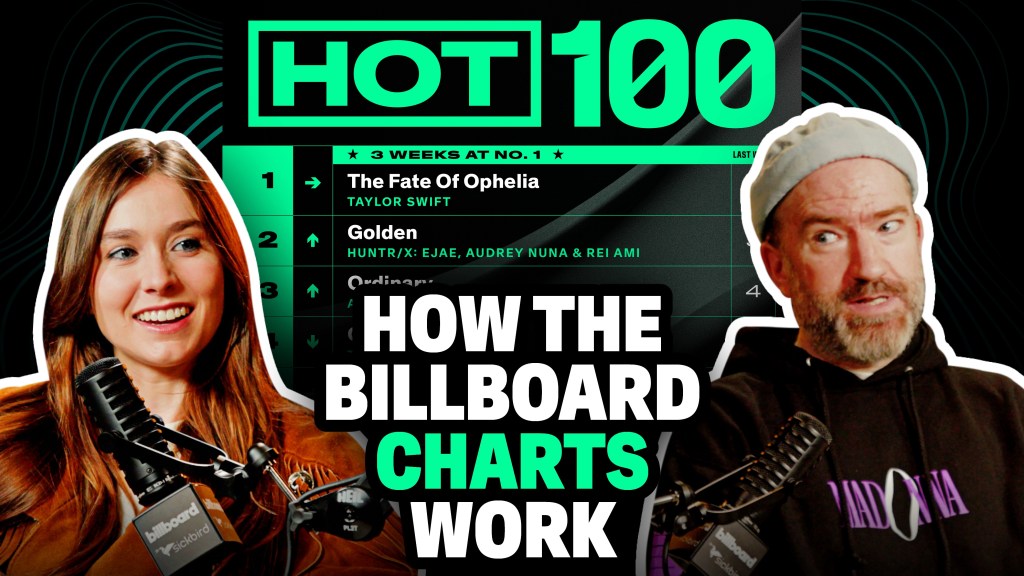
Trending on Billboard What does it take to land a song on a Billboard chart? Billboard’s managing director of charts & data operations, Keith Caulfield, joins host Kristin Robinson to unpack the evolution of the Billboard charts. From the origins of the Hot 100 and Billboard 200 to the modern formula of blending radio, sales […]
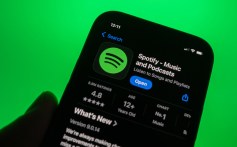
Trending on Billboard
A lot is changing at Spotify. In recent weeks, the company announced its founder and CEO, Daniel Ek, is stepping down from the CEO post (he will stay on Spotify’s chairman); it announced plans to develop generative AI music models with the support of the music industry; it updated its AI policies; it finally launched lossless audio; it updated its free tier; it forged new deals with a number of top music companies; and the company rolled out a number of new features, like direct messaging and “Mix With Spotify.”
The changes are a lot to keep track of, so on this week’s episode of Billboard’s new music business podcast, On the Record w/ Kristin Robinson, Spotify’s global head of marketing and policy, music business, Sam Duboff, joins to explain how the company is evolving, from a static destination for music consumption to what he calls “a place where fans can experience the whole world of an artist.”
Related
Duboff is one of the executives who determines how Spotify will handle the growing presence of AI music on its platform. He also is key in the development of Spotify for Artists, the company’s hub for musicians that enables them to manage their artist profiles and connect with fans.
Below is an excerpt of Billboard’s wide-ranging conversation with Duboff on this week’s episode of On the Record, focusing on its treatment of AI music on the platform.
Watch or listen to the full episode of On the Record on YouTube, Spotify or Apple Podcasts here, or watch it below.
I wanted to hear a little bit more about the fact that y’all are developing generative AI with the consent of many players in the music industry. There isn’t much information out there, so what is going on?
Duboff: We have been hearing from artists and their teams for a few years now that merging music AI tech products don’t feel like they’re built for them, not built for the power of their businesses, their careers, their existing fan bases. So we recently announced we’re collaborating with some of our top industry partners, across major labels and indies, to collaboratively develop artist-first, responsible AI music products.
So what would that look like?
We want to do this in consultation with the industry. People talk to artists about it, songwriters about it, and it feels like a lot of principles about AI and music and what these should look like. It’s happening in real time. So we didn’t want to wait until we have a product ready for a big launch to start talking about how we’re going to build AI products. We want to talk now, while we see lots of other folks in the industry are investing in the space, to be clear about our principles and how we’re gonna work with the industry for any product we build. So we’re looking at four key principles we outlined.
Related
First, [we have forged] upfront agreements with the music industry. [We are] not using tons of music [without permission] and asking for forgiveness later. Second, we wanna make sure artists, songwriters, rights holders have agency and choice about how their music does or doesn’t participate in these tools. They should have control and choice around how fans can or can’t interact with the music using AI. Third, we will always have proper monetization and compensation built in. So artists, songwriters, right holders [are] always compensated for all uses of their work [and] properly credited transparently. We’ll have an eye towards building new revenue streams for the music industry, so not just splitting up the existing royalty pool. We think that could be really important for powering what the next stage of the music industry looks like. Fourth, and really important to us, when we think about our role right now in music, is we want to build AI music products that deepen existing artist-fan connections. With 700 million monthly listeners coming to Spotify already, to listen to their favorite artists, we can play this really unique role where we build tools and help fans go deeper with their favorite artists and connect with their favorite artists in new ways, and make sure AI tools aren’t there to kind of compete with artists or to try to replace human artistry.
I know it is still very preliminary, but you talked about how this will increase the connection between fans and artists. Tell me if I’m off base, but it kind of sounds more like Spotify is leaning towards AI-powered remixing of current songs, rather than a model that generates a new song from scratch, like Suno or Udio, right?
Yeah. I think we see our role as the biggest streaming home for professional artists today. We facilitate those connections between artists and fans through their music already. So we think we’re best positioned to help have AI power this next stage of the industry. In some ways, it’s just in that space of existing artists and connections and building on artists’ catalogs with their consent. Yeah, not tools that are built to compete or kind of siphon off [royalties] from parts of the industry.
Related
To me, this signals a shift for Spotify. Spotify has always been the final destination for listening. This now feels like it’s a more playful, interactive music creation tool. Do you see Spotify continuing to expand from being the place for static streaming?
Over the past few years, we’ve been evolving Spotify from a place that’s just about the music to giving artists all these tools to share the world around their music. So three, four or five years ago, on Spotify, you get an artist profile with some pictures and canvases [looping visuals paired to songs]. It was mostly just about the music, and then you’d have to go to social media or elsewhere to experience the artist’s broader world. Where we’ve been focusing is bringing in artist clips so that artists can share 30-second videos, sharing the meaning of their songs, music videos, live performance videos, which we’ve launched in 100 countries outside the U.S. We’re working to bring that to the U.S. [There are] countdown pages that build up your album release. You can sell your merch in advance. We’re seeing artists use that in really creative ways. So we’ve already been on this journey of making Spotify a place where fans can experience the whole world of an artist. These AI music principles are an extension of that philosophy.
Spotify has also recently updated its policies on AI music. This included a note that the service has removed “75 million spammy tracks.” I’ve seen some outlets post stories about this figure incorrectly, calling it 75 million AI tracks, but it feels like the word “spammy” is intentional, referring to both AI spam and human-made spam. Can you explain what Spotify meant by this?
We’ve definitely seen modern Gen AI tools increase the scale of spam, and so certainly AI played a role in this scale. Not so long ago, there weren’t even 75 million tracks on streaming services, and now, we’re removing that many, but yeah, we’re working to identify spam, regardless of whether AI’s part of the creative process or not.
Related
Spotify is also working with DDEX to create a standardized way to disclose exactly how AI is used in the music creation process. It feels like a step in the right direction to create a standard, but if I’m a bad actor, why would I self-disclose? I probably wouldn’t.
We see this as the first step. No matter what the long-term solution is going to be, of the system of incentives and deterrence that will get people to disclose, the starting point has to be shared language through the existing supply chain of music about what the formatting of that will be.
But I think you do see already a lot of artists, songwriters, producers, starting to talk about how they’re using AI more often. So you see the K-Pop Demon Hunters songwriter who talked about brainstorming with Chat-GPT when he wrote “Soda Pop” through to Brenda Lee using AI to translate “Rockin’ Around the Christmas Tree” into Spanish, but still her voice. It was so cool, but it may have been confusing for Spanish listeners, if they thought Brenda Lee or any artist spoke a language they don’t speak. Now, [with the DDEX partnership] it will be really cool for them to know transparently [exactly how AI was used.]
When Spotify came out with these policies, it did feel like a start, but I heard from some people that they felt it didn’t go far enough. So, what do you say to those who feel like it’s not going far enough?
It’s early days for AI tech. I know it feels like it’s moving fast, but consumption of AI-generated music’s insanely low. We have some time for artists, songwriters, producers to take the lead in figuring out how they want to use these tools. We don’t want to act like we know where AI music’s headed and exactly every policy and role we need to future-proof for the next two or three years. But also, we didn’t just want to wait and do nothing. Some areas we all can agree now that we need to act now, no matter where AI tech heads. We think it’s going to be necessary to have great systems in place to stamp out spam, deception, impersonation. So that’s our starting point. We try to be upfront. We see these as first, critical early steps. There’s more to come.
Related
French streaming service Deezer reported recently that 28% of daily uploaded songs are fully AI-generated. That’s a shockingly high number. At Spotify, have you seen the same figures?
AI detection tech isn’t really foolproof yet. You know, every streaming service has pretty much an integral catalog. We have no reason to disbelieve it’s a similar amount on any streaming service. That said, I think they shared the point that .5% of streams is all those songs were getting. We’ve tried a few different tactics to test that — different detection tech, testing out different proxies — to understand how much prompt-generated music may be listened to on Spotify, and we find it is way lower than .5% in the share of streams, in total consumption. So I know sometimes it feels scary when you see those upload percentages…but yeah, there’s a lot of uploads [of AI music.] We’re doing a lot of work to release that kind of spam, where there are mass uploads that can add up to those kinds of percentages, but keeping a close eye on the part that actually matters, which is, are listeners listening to it? Is it generating royalties?
Consumption being really low makes me think that it must be a burden on streaming services to hold all of this music, especially when no one’s listening to it. Would Spotify ever remove tracks that are just getting absolutely no traction?
I don’t think so. Whether they’re AI or otherwise, people upload their music to streaming services for all different reasons. I have family members that upload music to send to family and friends. That’s a great thing at Spotify, [where] we are focused on emerging and professional artists. Our policies are in service of professional artists and emerging artists on their way to that. So we take on the burden of how many songs are uploaded, and certainly the overwhelming majority of songs aren’t getting streamed much. I still think it’s really important for there to be this open outlet.
Related
Is this a cloud storage issue? I have no idea how big these songs are to hold onto.
Maybe someday, with AI scale, it will be.
Earlier this year, I spoke to Spotify’s global head of editorial, Sulinna Ong, and I asked her about whether or not she would ever forbid AI tracks from living on Spotify editorial playlists. She didn’t have a clear answer at that moment — it wasn’t a yes or a no, so I wanted to ask again. Could you ever imagine fully AI-generated tracks living on a Spotify playlist?
It’s a hard question, because I think we recognize AI music as a spectrum… I think what you’re getting at is completely prompt-generated music without any human input. Is there some world where listener behavior really changes, and there’s huge musical, cultural relevance from music that doesn’t spam, deceive or impersonate, but somehow finds an audience, [that] could make it on to a viral hits sort of playlist? I can’t speak for their team, but fundamentally, 100% of the focus of our editorial efforts is helping to identify, uplift [and] develop the careers of professional artists who are making amazing music. So it’s always hard to answer that question in absolutes, but certainly that’s not the focus of anyone at Spotify, or, I think, any streaming service.
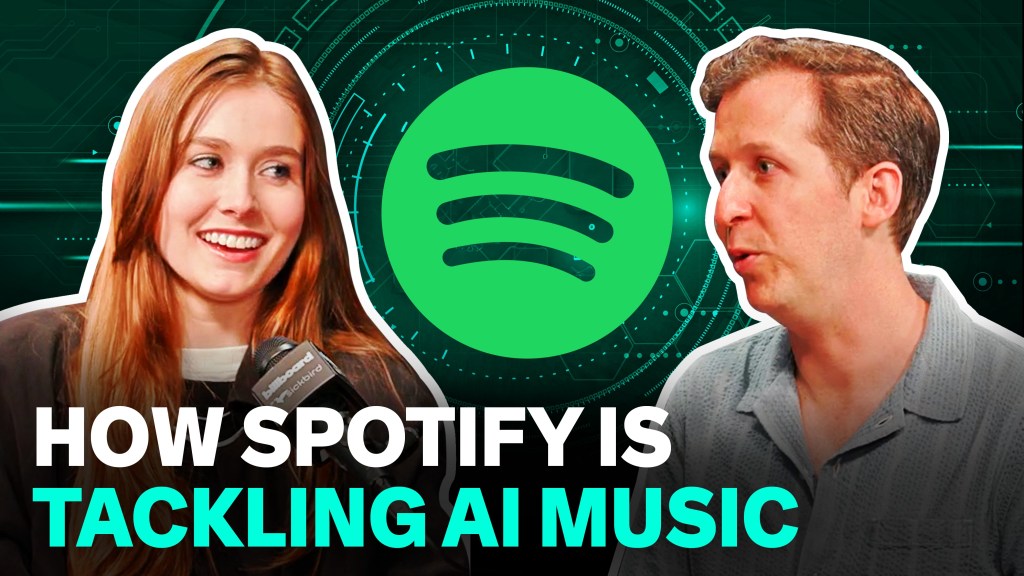
Trending on Billboard Is Spotify becoming more than just a place to stream songs? This week, Spotify’s global head of marketing and policy, music business, Sam Duboff, joins host Kristin Robinson to talk about how the platform is evolving to serve both artists and fans in new ways. From developing AI tools with the music […]
-
Pages

 State Champ Radio
State Champ Radio 